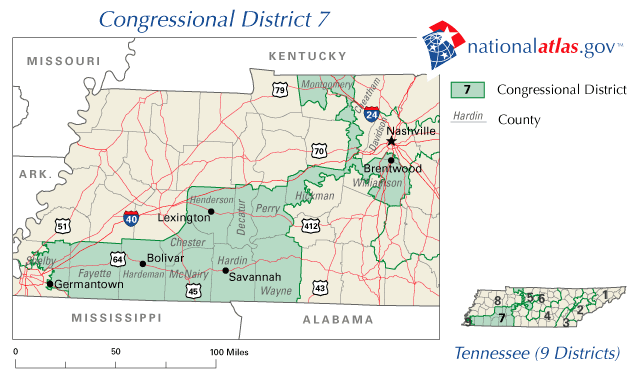- Tennessee's 7th congressional district
Infobox U.S. congressional district
state = Tennessee
district number = 7
image width = 350
image caption =
representative =Marsha Blackburn
party = Republican
english area =
metric area =
percent urban =
percent rural =
population = 632,143
population year = 2000
median income = 50,090
percent white = 84.6
percent black = 11.5
percent asian = 1.5
percent native american = 0.3
percent hispanic = 2.2
percent other race = 0.1
percent blue collar =
percent white collar =
percent gray collar =
cpvi = R+12The 7th Congressional District of Tennessee is a congressional district located in the middle and southwestern parts of the state, connecting suburbs of Memphis and
Nashville . It is the state's wealthiest district in terms ofper capita income , as well as the third-largest in area.Cities in the district include Germantown, Brentwood, Bolivar, Lexington, and Savannah. It also includes most of
Clarksville , as well as Tennessee's share of nearbyFort Campbell . Also in the district are portions of Nashville, Memphis and Collierville.The district's current configuration dates from
1983 , when Tennessee gained a district as a result of the 1980 Census. At that time, large portions of the old 6th District were shifted to the 4th and 9th districts, and the remaining territory of the old 6th was renumbered the 7th. Prior to the reapportionment that resulted from the 2000 Census, the district's boundaries generally coincided with county lines [ [http://tnatlas.geog.utk.edu/website/cd106/viewer.htm 106th Congress Congressional Districts] in Tennessee Electronic Atlas] , but inMiddle Tennessee , the 7th district's current geography resembles agerrymander (see image).The 7th is a very safe seat for the Republican Party. In fact, it is the state's most Republican area outside the party's traditional heartland in
East Tennessee . Democrats have made only two serious bids for the district since it took on its current form in 1983, and came within single digits only once. Most of the district's residents have not been represented by a Democrat since1973 .The district's politics are dominated by the wealthy suburbs of Memphis (e.g., Germantown, Collierville, Cordova) and Nashville (e.g., Brentwood, Franklin). These areas boast some of the highest median incomes in the nation, and have swelled with former Nashville and Memphis residents since the late
1960s . At first, this was due to anger over court-ordered desegregation. Since the late1970s , the motivation has been a desire to seek more "family-friendly," religious environments (as opposed to the urbane liberal orientations of Nashville and Memphis). They give the 7th a character similar to other highly affluent suburban districts in the South (e.g., those around Birmingham,Dallas-Fort Worth ,San Antonio ,Houston andAtlanta ). Many of the state's most politically active churches are located in the suburban areas of the district, giving the 7th a strong social conservative tint typical of most affluent Southern suburban districts. Republicans dominate every level of government in the suburban areas, which tend to elect some of Tennessee's most conservative state legislators.The rural areas of the district are demographically similar to the neighboring 8th District, and mostly send Democrats to the General Assembly. However, most of the Democrats in the 7th's rural areas are as conservative on social issues as their suburban counterparts. They have long been more willing to support Republicans at the national level than their counterparts in the 8th. Many of the rural counties now in the district, for instance, voted overwhelmingly for
George Wallace 's (then governor of nearbyAlabama )1968 presidential candidacy, making Tennessee the strongest-performing state for him that he did not win.The only significant blocs of reliably Democratic voters left in the district are
African-Americans who reside in Fayette and Hardeman counties (borderingMississippi ), mostly descendants ofslave s who worked on the area'splantation s in the19th century , as well as in portions of Clarksville; Fayette County, in fact, supportedBill Clinton during both of his runs for president. At the ballot box, however, they are no match for the coalition of wealthy suburbanites and rural conservatives. This factor inhibits the development of anything like a political community enjoyed by their neighbors in Memphis' 9th District.Marsha Blackburn , a Republican and the first-ever woman to represent this part of Tennessee in Washington, assumed the 7th District's seat in2003 .Representatives
References
Wikimedia Foundation. 2010.
